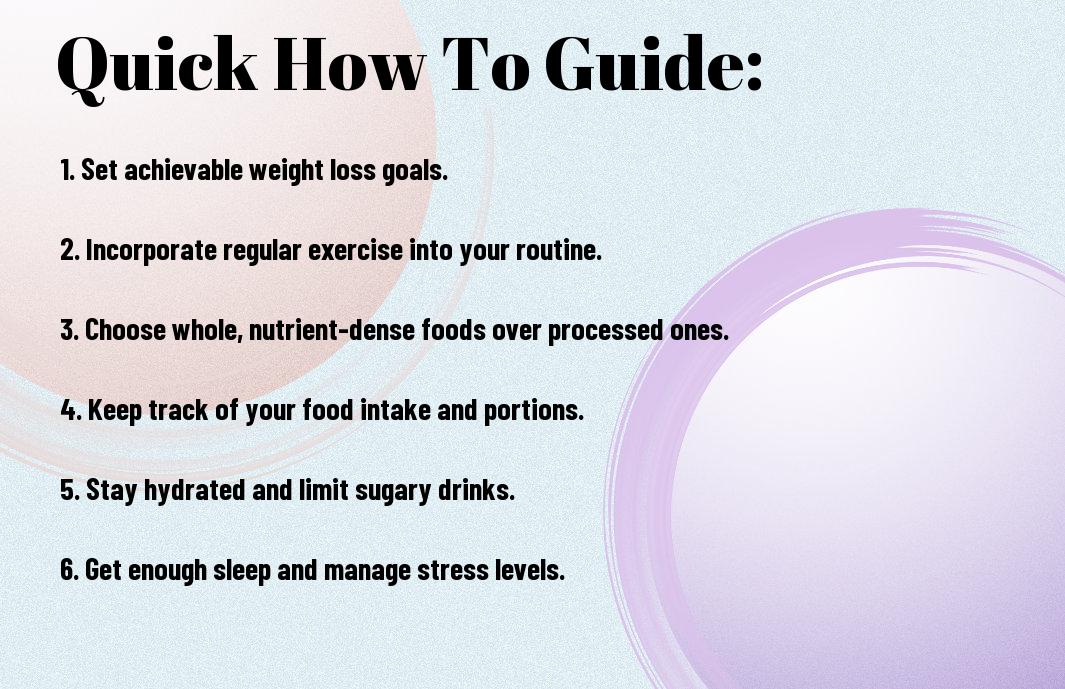In this comprehensive guide, we will delve into the most effective strategies and healthy tips for achieving quick and lasting weight loss. From the latest scientific research to practical lifestyle changes, we will cover everything you need to know to reach your weight loss goals. Say goodbye to fad diets and complicated workout routines, as we provide you with simple, sustainable methods that will help you achieve a healthier and happier life.

Factors Influencing Weight Loss
Even though many people think of weight loss as a purely physical process, there are a variety of factors that can influence the success of your efforts. These factors can range from genetic and metabolic influences to emotional and psychological aspects. Recognizing and addressing these factors can be crucial for achieving and maintaining a healthy weight.
- Genetic and metabolic factors
- The impact of lifestyle choices
- Emotional and psychological aspects
Perceiving weight loss as a holistic process that takes into account these different influences can help you develop a more effective and sustainable strategy. For more information on this topic, you can read the Weight loss: 6 strategies for success article from the Mayo Clinic.
Genetic and Metabolic Factors
Any successful weight loss plan should consider the genetic and metabolic factors that can affect an individual’s ability to lose weight. Factors such as genetic predisposition, hormonal imbalances, and metabolic rate can all play a role in how our bodies respond to diet and exercise.
- Genetic predisposition
- Hormonal imbalances
- Metabolic rate
Assume that individuals may have different weight loss experiences due to these inherent factors, and it’s important to tailor a weight loss approach accordingly.
The Impact of Lifestyle Choices
Influencing lifestyle choices can have a significant impact on weight loss. Factors such as diet, physical activity, sleep patterns, and stress levels all play a part in determining an individual’s ability to lose and maintain weight.
Factors such as diet, physical activity, sleep patterns, and stress levels all play a crucial role in an individual’s weight loss journey. By addressing these factors and making positive changes where necessary, individuals can optimize their potential for successful and lasting weight loss.
Emotional and Psychological Aspects
Genetic and metabolic factors are not the only influences on weight loss. Emotional and psychological aspects, such as stress eating, body image issues, and past experiences with dieting, can also profoundly impact an individual’s ability to achieve their weight loss goals.
Metabolic and emotional factors can greatly affect a person’s relationship with food and their ability to maintain a healthy weight. By addressing and managing these aspects, individuals can develop a more balanced and sustainable approach to weight loss.
How-To Implement Healthy Eating Habits
After making the decision to embark on a journey to quick and lasting weight loss, one of the first steps is to implement healthy eating habits. This is a crucial aspect of achieving and maintaining a healthy weight. To guide you on this journey, I highly recommend reading The Weight Loss Triad, 2nd Edition, a comprehensive guide to understanding the essential elements of healthy and sustainable weight loss.
Identifying Nutrient-Rich Foods for Everyday Consumption
Identifying nutrient-rich foods is vital for nourishing your body and achieving your weight loss goals. When grocery shopping or planning your meals, opt for whole foods such as fruits, vegetables, lean proteins, whole grains, and healthy fats. These foods are packed with essential nutrients, fiber, and antioxidants, which promote overall health and support weight loss.
Planning and Preparing Balanced Meals
HowTo plan and prepare balanced meals is key to maintaining healthy eating habits. Start by creating a meal plan that includes a variety of nutrient-rich foods. When cooking, focus on incorporating a balance of macronutrients – protein, carbohydrates, and healthy fats – into each meal. This approach ensures that your body receives the nourishment it needs while supporting your weight loss journey.
Implementing a meal prep routine can also simplify your healthy eating habits by ensuring that nutritious meals are readily available throughout the week. By taking the time to plan and prepare your meals in advance, you can avoid unhealthy food choices and stay on track with your weight loss goals.
Tips for Managing Portion Sizes and Snacking
HowTo manage portion sizes and make smart choices when snacking is crucial for healthy eating habits. When serving meals, use smaller plates to help control portion sizes. Additionally, be mindful of recommended serving sizes for different food groups. As for snacking, opt for nutrient-dense options such as mixed nuts, Greek yogurt, or raw vegetables, and practice portion control to avoid overindulging.
- Choose smaller plates and bowls
- Measure portions to avoid overeating
- Keep healthy snacks readily available
This approach to managing portion sizes and snacking plays a significant role in supporting your weight loss efforts. Recognizing the importance of portion control and mindful snacking can contribute to overall calorie reduction and improved eating habits.
Tips for Incorporating Effective Exercise Routines
For successful and lasting weight loss, it is essential to incorporate effective exercise routines into your daily life. Regular physical activity not only helps in burning calories, but also aids in boosting metabolism, improving mood, and enhancing overall well-being. Here are some tips to help you make the most out of your exercise routines:
- Set realistic fitness goals to keep you motivated and on track.
- Find the right type of exercise that suits your preferences and fits your lifestyle.
- Stay motivated and overcome plateaus with proper strategies and mindset.
Perceiving the role of exercise as an integral part of your weight loss journey is crucial. By incorporating effective exercise routines, you can achieve your fitness goals and maintain a healthy lifestyle in the long run. For more valuable tips and strategies, check out The Ultimate Guide to Weight Loss: Tips and Strategies for …
Setting Realistic Fitness Goals
Routines
When incorporating exercise into your weight loss plan, it’s important to set realistic fitness goals. Whether it’s committing to a certain number of workouts per week, increasing your stamina, or reaching a specific weight, having clear and achievable goals will help you stay focused and motivated throughout your journey.
Finding the Right Type of Exercise for You
Fitness
Fitness
This step is crucial in making your exercise routines sustainable. By finding the right type of exercise that resonates with you, whether it’s cardio, strength training, yoga, or any other form of physical activity, you are more likely to enjoy your workouts and stick to them in the long term. Consider your preferences, schedule, and any physical limitations when choosing the type of exercise that suits you best.
Incorporating a variety of exercises can help prevent boredom and keep your body challenged as you progress. Mixing up your routines with different types of workouts can also help prevent plateaus and maximize results. Remember to listen to your body and make adjustments as needed to avoid burnout or injury.
To maintain motivation and overcome plateaus, it’s important to stay committed to your exercise routines and make adjustments when necessary. By setting realistic goals, finding the right type of exercise, and incorporating variety into your routines, you can stay motivated and overcome plateaus on your weight loss journey. Remember to celebrate your progress and stay committed to your overall well-being.

The Role of Hydration and Sleep in Weight Loss
To achieve quick and lasting weight loss, it is crucial to pay attention to two key factors: hydration and sleep. These often overlooked aspects play a significant role in weight management and can greatly impact your journey towards a healthier body and mind.
Understanding the Importance of Water for Weight Management
Weight management is closely linked to hydration, as water plays a crucial role in various bodily functions, including metabolism and digestion. Staying adequately hydrated can help curb unnecessary snacking and overeating, as thirst is often mistaken for hunger. By replacing sugary drinks with water, you can significantly reduce your overall calorie intake, leading to healthier weight loss and maintenance. Additionally, water can help flush out toxins from the body and improve overall energy levels, making it an essential component of any successful weight loss plan.
Furthermore, drinking water before meals can help control portion sizes and contribute to a feeling of fullness, leading to reduced calorie consumption. It is recommended to drink at least 8-10 glasses of water per day, and even more if you engage in regular physical activity, to support your overall weight loss efforts.
The Connection Between Sleep Quality and Weight Loss
One of the often underestimated aspects of weight loss is the role of sleep quality. Sleep deprivation can lead to hormonal imbalances that affect appetite regulation, leading to increased cravings and overeating. Inadequate sleep has been linked to decreased levels of leptin, the hormone responsible for signaling fullness, and increased levels of ghrelin, the hormone that stimulates hunger. This imbalance can lead to poor food choices and disrupted eating patterns, hindering weight loss efforts.
Sleep also plays a crucial role in muscle recovery and growth, which are essential for an effective exercise regimen. Poor sleep quality can impair physical performance and reduce the overall effectiveness of your workouts, making it harder to achieve your weight loss goals. Prioritizing good sleep hygiene and aiming for 7-9 hours of quality sleep each night is essential for optimal weight management and overall well-being.

